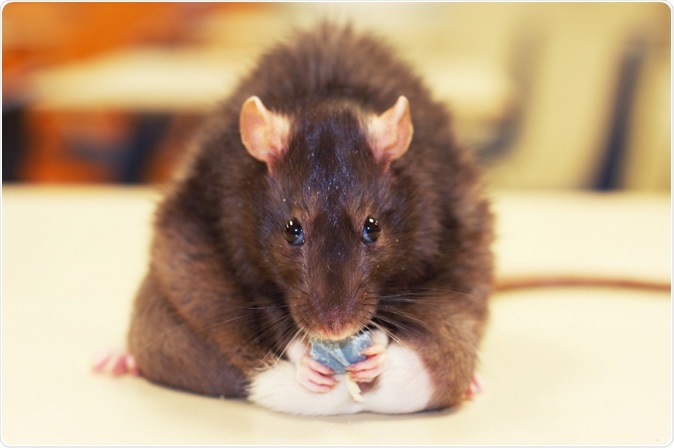A new study from researchers at the Binghamton University, State of University of New York has shown that obesity is associated with reduced taste responses and perception. The study on laboratory animals titled, “Taste Responses in the Nucleus of the Solitary Tract of Awake Obese Rats are Blunted Compared with those in Lean Rats” has been published in the latest issue of the journal Frontiers in Integrative Neuroscience.

The research with rats provides some insight into the mechanism(s) underlying altered taste perception in humans with obesity. Image Credit: Stester / Shutterstock
The researchers explain that there have been anecdotal evidence showing that obesity reduces taste perception and that obese people tend to enjoy and savour their food less. This has however never been proven, they write. The authors write, “Along with a constellation of hormonal and physiological changes that accompany obesity, alterations in the taste system are also evident. For example, an increase in visceral fat is negatively correlated with both olfactory and taste function.” They add, “In both humans and rodents, taste sensitivity changes with body weight, specifically for taste qualities that signal high-energy availability, e.g., sweet and fatty.” This meant that for both rats and humans excess sweet and fat rich food has been known to reduce the smell and taste perceptions of food. Senior author Professor Patricia Di Lorenzo, from the Department of Psychology, Binghamton University, Binghamton, NY, said in a statement, “It's surprising that we know so little about how taste is affected by obesity, given that the taste of food is a big factor in determining what we choose to eat.”
Di Lorenzo and former graduate student Michael Weiss studied the nucleus tractus solitarius (NTS) in the brain. The NTS is responsible for processing taste sensation in the brain. They fattened lab rats on high fat diet and thereafter tested taste responses in their brains. Results revealed that rats that were obese had a smaller magnitude of their taste sensation and also had a shorter duration of the sensation compared to rats that were lean. The perception of taste also took longer in the obese rats, the team of researchers wrote. They concluded that high fat diets not only blunted the taste responses in the brain but also weakened the relationship between food intake and taste sensations.
For the experiment the team took Male Sprague-Dawley (a species of lab rats) rats and implanted microelectrodes in the NTS region of their brains. The obese rats were fed and fattened for 8 weeks before being included in the study. These rats were fed a diet of 45 percent fat and 17 percent sugar. There were a total of 49 obese rats and 74 lean rats in the experiment.
Once ready the rats were first deprived of water. Then they were allowed to lick different experimental tasters in a chamber. These tasters were of different tasters and were alternated with solution of artificial saliva (AS). Each of the rats were allowed five consecutive licks on the taster followed by 5 licks on AS.
Results showed that obese rats had a smaller response in their NTS in response to the tastes. The magnitude and duration were both less in the obese rats. The duration to respond to the taste was also longer for the obese rats compared to the lean rats, the researchers found. On the other hand the team also found that the taste responsive cells were more in number among the obese rats compared to the lean rats. The researchers coded the “lick coherence temporally and found that in the obese rats the taste cells, conveyed less information about taste quality than cells in lean rats.” They also report a “weakened association of taste responses with ingestive behaviour.” They added, “An additional 620 cells were recorded alongside taste-responsive cells in the NTS of DIO and lean rats, the great majority of which showed firing patterns that closely tracked licking behavior.”
According to Di Lorenzo, this theory may hold true for humans as well. She added, “Others have found that the number of taste buds on the tongue is diminished in obese mice and humans, so the likelihood that taste response in the human brain is also blunted is good.” As a next step of the study the team is looking at the effects of gastric bypass surgery or bariatric surgery on the brain stem cells to see the responses to taste in these cases. The idea is to check if the taste perceptions could return if the gastric bypass surgery is performed.
The authors concluded, “...taste-responsive cells in the NTS of DIO (diet induced obese) rats are more narrowly tuned and convey significantly less information about taste quality than taste-responsive cells in lean rats.” They added, “The changes noted here may provide some insight into the mechanism(s) underlying altered taste perception in humans with obesity... Although there is evidence that weight loss improves taste perceptions in humans with obesity it is unclear whether the changes found in the NTS of DIO animals can also be reversed. Further research will address this question.”
Journal reference:
Weiss Michael S., Hajnal Andras, Czaja Krzysztof, Di Lorenzo Patricia M., Taste Responses in the Nucleus of the Solitary Tract of Awake Obese Rats Are Blunted Compared With Those in Lean Rats, Frontiers in Integrative Neuroscience, DOI=10.3389/fnint.2019.00035, https://www.frontiersin.org/article/10.3389/fnint.2019.00035